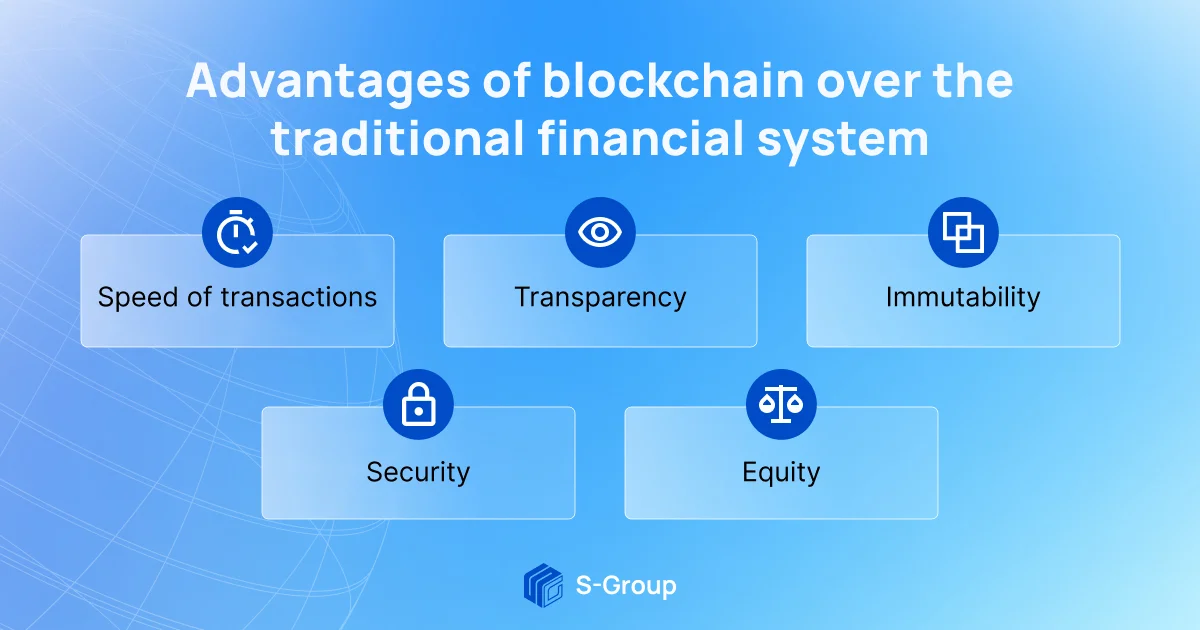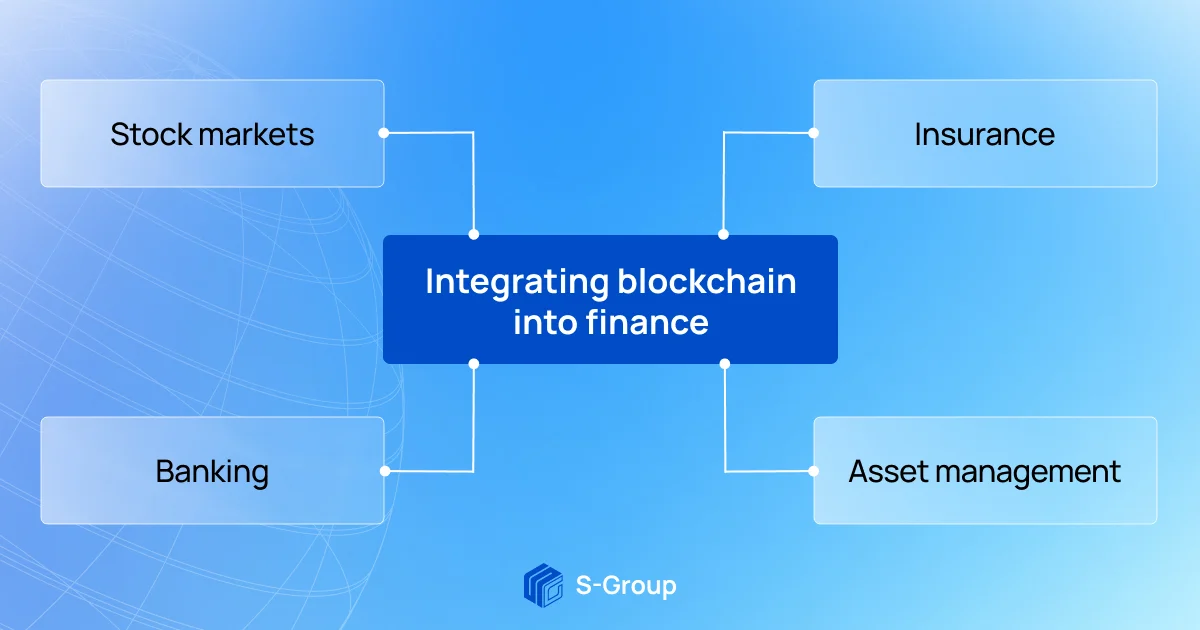Blockchain technology: financial impact and prospects

The appearance of the first cryptocurrency Bitcoin in 2009 and the further development of blockchain technology influenced the perception of the traditional financial system. In 2021, the number of cyberattacks on the financial sector increased by 350% compared to 2020. Therefore, blockchain qualities such as transparency, security, and decentralization have become the basis for protecting the financial system from cyberattacks and scam.
The advantages of blockchain technology over the traditional financial system and options for its implementation are discussed in a new article.
Definition and advantages of blockchain over the traditional financial system
In January 2009, an anonymous creator of Bitcoin launched the first cryptocurrency block and left the message: “Chancellor on Brink of Second Bailout for Banks”. This message was not explained, but the crypto community perceived it as an attempt to replace bitcoin with the standard by using blockchain and its key features.
Blockchain is a distributed registry technology where information is stored and changed equally for each user of the system. Blockchain consists of a chain of blocks that are interconnected: each new block contains information about the previous one. This means that there is no central authority in the system that could change or delete information in the chain. The essence of blockchain is transparent and secure transactions due to the immutability of the registry and its decentralization. You can learn more about what blockchain is here.
The main advantages of blockchain technology over the traditional financial system.

- Speed of operations. Through the direct exchange of data between users, transactions go faster without waiting for confirmation from a central authority. In blockchain, the confirmation of transactions is done by all participants in the system.
- Transparency. Each network user has access to all blocks existing in it. Network members see wallet addresses, transaction amounts, and all data entered into the blockchain except for users’ identities. This makes blockchain anonymous.
- Immutability. Each new block contains information about the previous block, creating a continuous data chain. A user cannot change the data in an existing block, because for this he will need confirmation from more than 50% of the network participants.
- Security. With intermediaries, there is always the risk of data leakage or violation of the original terms. Blockchain eliminates this risk by using smart contract technology, which uses algorithms to control the execution of the operation and compliance with predetermined conditions.
- Equality. All users of the system participate in the formation of the blockchain and together determine which block will be added next.
Blockchain integration in the financial sector
Cryptocurrencies have greatly influenced the development of blockchain technology. They are virtual currencies that have no physical expression and are protected from counterfeiting and hacking by cryptography. To receive cryptocurrency, it is enough to create a wallet on a centralized or decentralized exchange and then exchange a fiat currency in it. You can also get cryptocurrency using mining or staking.
The most active application of blockchain technology is the crypto sphere. But besides cryptocurrencies, blockchain is also being integrated into other areas of the financial sector.

1. Stock markets
Smart contract technology automates and speeds up securities' settlement by reducing transaction times and operating costs. Blockchain decentralization makes the process safe and transparent, as each investor can see when and how much was paid.
For example, NASDAQ uses blockchain technology to issue and exchange securities, and the London Stock Exchange is exploring the possibilities of blockchain to change the way securities are traded in Europe.
2. Banking services (payments and remittances, lending)
Global money payments and transfers are controlled by centralized authorities. Blockchain decentralization optimizes all types of services, makes them more transparent, reduces transaction times and preserves the anonymity of the parties. Blockchain technology simplifies the verification of financial documentation for loans, which speeds up the process of granting loans. The immutability of blockchain and smart contract technology allows for automated payouts and increases security that the traditional financial system lacks.
In February 2021, Mastercard announced that it would begin supporting several types of cryptocurrencies in its payment system. This will make it possible to store and use cryptocurrency for transactions. Visa also plans to support cryptocurrency transfers and payments. Both payment systems are evolving towards blockchain and developing new financial instruments.
3. Insurance
The insurance industry is gradually adopting blockchain technology in its operations. The decentralization nature of blockchain allows the insurance company and the customer to observe the process of processing an insurance claim in real time. Smart contract technology automates insurance payments, makes transactions safer and more transparent.
The immutability of the blockchain helps to track information about insurance payments from the company and the client, which ensures transparency in cooperation. This allows insurance companies to work more efficiently and spend less time rechecking and confirming data.
4. Asset Management
Blockchain technology in asset management enables everyone in the network to interact directly with assets, automate fund management with increased security, data accuracy and reduced transaction delays.
Regulation of cryptocurrencies

In its early days, blockchain and cryptocurrency were distrusted. Financial companies called the technology fraudulent and advised clients not to use cryptocurrency. Now, cryptocurrency is being sought for both payments and investments. In 14 years, blockchain and cryptocurrencies have evolved from a new technology to a promising tool for profit.
States' attitudes toward regulating cryptocurrencies has also changed. A number of countries have already adopted amendments regarding cryptocurrencies to their legal system:
- El Salvador was the first in the world to legalize bitcoin as an official means of payment. Now, all authorities within the country have no right to refuse to accept payment in bitcoins.
- Singapore passed amendments that make income from cryptocurrency trading and any crypto transactions tax-free.
- Slovenia not only removed the tax on cryptocurrency trading, but also the VAT on mining. Cryptocurrency payments are actively accepted in the country.
- Switzerland treats cryptocurrencies as an asset, not a means of payment. But some areas of the country have already legalized bitcoin payments. .
- Malta has legalized crypto exchanges and continues to improve the conditions for projects with blockchain technology.
Blockchain prospects in the financial sector
Some countries already accept payments in virtual currency, and some just equate it with an investment asset, but even this is an important step in the blockchain’s adoption.
The blockchain industry is growing rapidly. Startups are emerging that are developing blockchain solutions for investments, digital financial management and impact on the financial system. It can be unequivocally argued that the financial sector is waiting for change, but in order for cryptocurrencies and blockchain to become a familiar means of payment, we need to continue to explore the technology.
Share
Interesting
Would you like to receive a digest of articles?
One email with the best articles of the week.
Sign up so you don't miss anything.